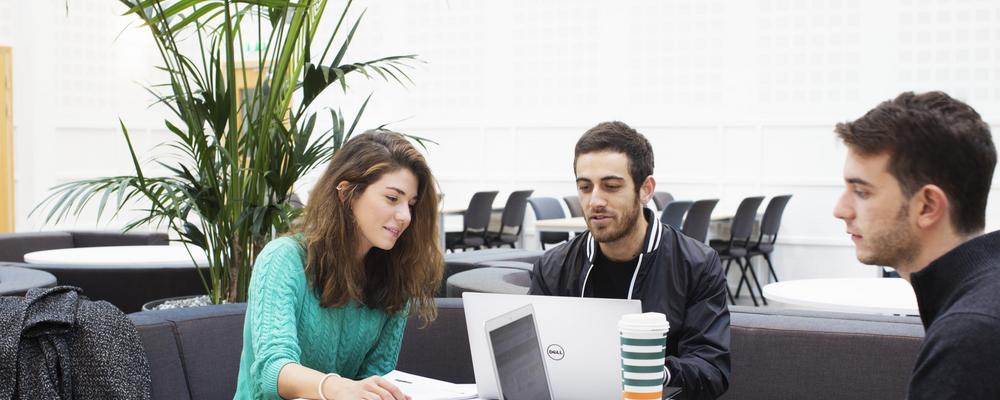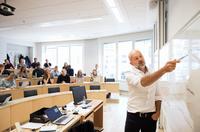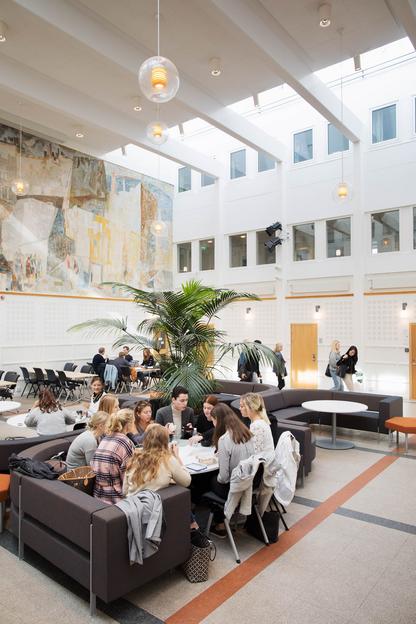
Facts & Figures
The School was founded in 1923 as a private business school. In 1961 the School became a public institution. After its amalgamation with the University of Gothenburg in 1971, the School was recognized as an independent unit within the University in 1986. Today, the School comprises four departments, a number of research centres and other units. There are about 460 faculty and staff and 4 300 full-time students (about 8 000 individuals). The School is accredited by EQUIS, AACSB and AMBA - the “Triple Crown”.
Research
The School's research is conducted at four departments and several research centres, and distinguished by its broad approach, which is interdisciplinary in large measure, and its collaboration across geographical, departmental and disciplinary boundaries. Much of the research takes place in close co-operation with companies and organisations.
PhD Education
All four departments within the School offers PhD Education. The total number of admissions varies from year to year, partly because the Department of Business Administration only admits every two years.
| PhD Education 2024 | Total | Women | Men |
| Admitted for licentiate degree | 0 | 0 | 0 |
| Admitted for doctoral degree | 9 | 3 | 6 |
| Licentiate degree | 0 | 0 | 0 |
| Doctoral degree | 18 | 10 | 8 |
Education
Programme within the first cycle (in Swedish)
- Programme in Business and Economics, 180 ECTS credits
- Programme in Logistics Management, 180 ECTS credits
- Programme in Environmental Social Science, 180 ECTS credits
- Master of Laws Programme, 270 ECTS credits
Programme within the first cycle (in English)
- Bachelor's Programme in Business and Economics, 180 ECTS credits
Single subject courses within the first cycle
Business Administration, Economic Geography, Economic History, Economics, Human Geography, Law and Statistics.
Single subject courses within the second cycle (in Swedish)
- Management of Growing Enterprises., 60 ECTS credits
- Financial Reporting and Law, 60 ECTS credits
Master of Science Programmes, 2 years /120 ECTS credits (in English)
- Accounting and Financial Management,
- Economics
- Finance
- Innovation and Industrial Management
- International Business and Trade
- Knowledge-based Entrepreneurship
- Logistics and Transport Management
- Management
- Marketing and Consumption
Executive education
GU Executive Education offers Executive MBA programme, custom programmes and open-enrolment programmes.
Students 2024
| Full-time students | 4 179 |
| Individuals | 8 181 |
| Proportion of women | 51 % |
| Proportion of men | 49 % |
Graduates 2024
| Bachelor's graduates | 590 |
| 1 Year Master's graduates | 40 |
| 2 Year Master's graduates | 300 |
| Master of Laws graduates | 208 |


Employees
Average, number of individuals 2024
| Professors | 65 |
| Senior lecturers | 128 |
| Associate senior lecturers | 11 |
| Post-docs | 11 |
| Lecturer | 17 |
| Researchers | 27 |
| Associate researchers | 0 |
| Other | 23 |
| PhD students | 82 |
| Administration | 121 |
| Technical support | 12 |
| Total | 497 |
Internationalisation
Far-reaching international academic cooperation and exchange are essential for attaining excellence in research and education. It is an area in which the School is continously developing its activities.
Student exchange 2024/2025
- Outgoing 334
- Incoming 287
Students on Bachelor's Programme in Business and Economics with an international high school diploma/equivalent, 2024
109 (of 210, 52%)
Students on Master's Programmes with international background 2024/2025
275 (of 900, 31%)
Courses in English 2024/2025
| Bachelor level | Master level * | |
| Economic History / Human Geography | 8 | 3 |
| Business Administration / Economic Geography | 38 | 80 |
| Economics | 15 | 26 |
| Law | 0 | 1 |
| Other | 3 | 6 |
| Total | 64 | 116 |
* Refers to courses that can be read by master's students at Graduate School and/or exchange students.
Partner universities 2024/2025
Africa: 5
Asia: 42
Europe: 94
South America: 3
Central America: 2
North America: 23
Oceania: 11
Middle East: 2
Totalt: 182 (of which 55 refer to universities with an agreement with the University of Gothenburg within EUTOPIA)
Figures
Income 2024
| Government grants | SEK 379 million (64 %) |
| Individual grants and sales | SEK 206 million (35 %) |
| Commissions | SEK 9 million (1 %) |
| Other sources | SEK 2 million (0 %) |
| Total | SEK 595 million |
Costs 2024
| Staff | SEK 396 million (65 %) |
| Shared university facilities and libraries | SEK 76 million (13 %) |
| Premises | SEK 58 million (10 %) |
| Other operating costs | SEK 74 million (12 %) |
| Depreciation | SEK 2 million (0 %) |
| Total | SEK 605 million |
Financial outcome 2024
| SEK million | |
| Income | 595 |
| Costs | 605 |
| Net surplus/deficit | -10 |

History
There were plans to establish a business school in Gothenburg as far back as the late 19th century. As a major centre of trade, Gothenburg needed such an institution in order to provide future merchants with the academic and to some extent practical education required to fill leadership positions in the world of Swedish commerce.
However, the time was not right and it took until 1923 for the School of Business, Economics and Law to finally opened its doors. The first intake comprised just nine students, who were educated in economics, business administration, economic geography and legal studies, in addition to English, German, French and Russian.
The School will celebrate its centenary in 2023. A great deal has happened over the years, but there are also features that remain to this day, such as research based education, close collaboration with business and society, and an international perspective.
The Richard C. Malmsten Memorial Foundation
For many years, this foundation has played an important part in the life of the School. Through an extremely generous donation, the Foundation contributed to the realisation of the plans for a new School in 1995.
Since 1984, the Foundation has supported the School every year with large grants for both research and education, for example the Graduate School.
In 1887, Richard C. Malmsten and Gustaf Bergvall founded the wholesale trade and agency company Malmsten & Bergvall in Göteborg. Companies that subsequently developed included Apotekarnes Droghandlesaktiebolag (ADA) and the pharmaceutical company Pharmacia. The Foundation was set up in 1983, following a donation by the wholesaler Erik Malmsten, the grandson of Richard C. Malmsten. Its mail aim was to promote scientific, economic research and education at the University of Gothenburg.





